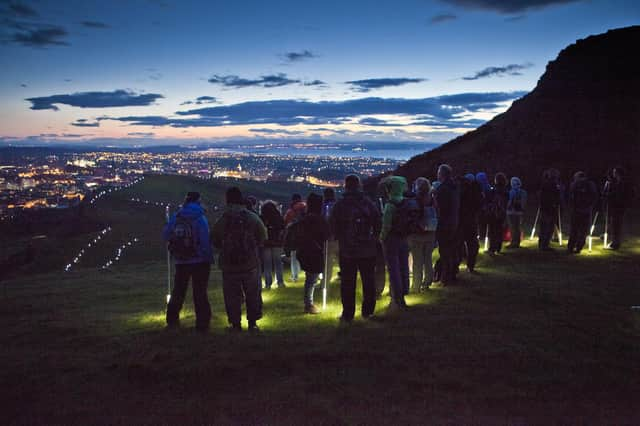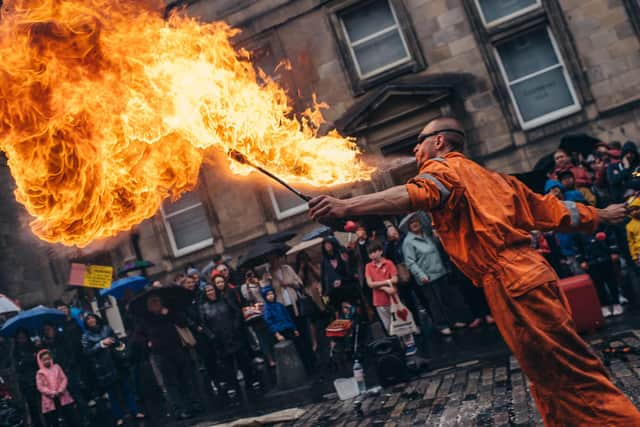Edinburgh's festivals pledge to drive down carbon footprint when they return from shutdown


The city's flagship cultural events will be pursuing a new direction following growing concerns about their impact on the environment and the sustainability of Edinburgh's tourism industry.
The cancellation of this year's festivals in the face of the spread of Covid-19 is said to have sparked a rethink on "how to sustain future cultural exchange without such intense global mobility."
Advertisement
Hide AdAdvertisement
Hide AdUmbrella body Festivals Edinburgh said the "carbon reduction route map" would look at how the city's major events needed to change over the next few years.
Last year's festivals were said to have seen more than 25,000 artists from 70 countries take part in around 5000 events.
The new commitment from the festivals, which will see them retain "internationalism" as a core value, will be at the heart of a drive to ensure that Edinburgh is a "world-leading festival city at the forefront of leading positive change."
Writing in The Scotsman today, Festivals Edinburgh director Julia Amour drew a comparison between the role of the festivals in the city's recovery from the pandemic and their origins when they were instigated to bring artists and audiences together after the Second World War.
Ms Amour said: "Pioneering Edinburgh’s identity as a place of cultural discovery for over 70 years, festivals have played a unique role in enhancing quality of life for locals, offering full-time livelihoods for at least 7,000 people, and developing Scotland’s place in the world.


"However, in recent years, the bite of austerity and pace of globalisation affected the city and its festivals to the point where debates became polarised about how to move forward with managing a cluster of events on a par with the football World Cup.
"Refocusing the visitor economy will support Edinburgh’s wider ambitions to be thriving low carbon pioneers.
Advertisement
Hide AdAdvertisement
Hide Ad"Across the festivals, we’re committed to a shared carbon reduction route map that identifies the areas of operations and wider systems that need to change.
"Internationalism remains a core value at this time of rising insularity, but the COVID-19 crisis is also fostering new thinking about how to sustain future cultural exchange without such intense global mobility.
"We all know that the world is changing faster than ever - even before the global pandemic - and that yet deeper challenges to wellbeing, livelihoods, equalities and the health of our planet will face us in the years to come.
"The way people are now being drawn to culture to find meaning, joy and balance in their lives echoes the founding spirit of the festivals after World War Two.
"Edinburgh took a leap of faith into the future in 1947: today, we urgently need festivals, other sectors and policymakers at all levels to map out together how we can renew our world-leading festival city to be at the forefront of leading positive change."
In evidence submitted to the Scottish Parliament on the impact of the pandemic, Festivals Edinburgh had warned that the city's major events were facing "grave risks" and in 2021 and beyond, with many experts predicting that social distancing restrictions will still be in place in the city next summer.
MSPs were told that the festivals needed additional public funding to help prevent "potential market failure" caused by a collapse in income from sponsors, donors and ticket buyers, uncertainty over how new hygiene regulations will affect events, travel curbs on international artists and a reluctance of some older festivalgoers to “gather in crowds.
Advertisement
Hide AdAdvertisement
Hide AdMs Amour said today: "The brilliant creativity of artists, performers and professionals is what makes festivals possible. We've been able to inject over £14 million a year into supporting creative talent and production across Scotland, launching countless careers.
"However, many freelancers have now fallen between the cracks of state support, and the cultural venues and production companies that employ them face huge uncertainty.
"Next season, budgets could be much reduced if audience numbers and ticket income are affected by wider public health concerns and economic hardship.
"Yet everyone involved in reimagining Edinburgh’s future has an interest in how the city can be attractive and affordable to the creative community. This makes it even more vital to plan together for how our cultural workers can be best supported, and marginalised voices given more space.
"Recent months have shown us that people are hungry to connect through culture. Despite the immediate challenges for live events, festivals have a vital longer-term role in helping places to thrive by creating reasons to come together for individuals, families, friends, communities and visitors.
"Two-thirds of residents previously took part in our festivals, and in building back we want to deepen our work with communities to make everyone feel welcome and help with the health and social impacts of the crisis."
A message from the Editor:
Thank you for reading this story on our website.
While I have your attention, I also have an important request to make of you.
Advertisement
Hide AdAdvertisement
Hide AdThe dramatic events of 2020 are having a major impact on many of our advertisers - and consequently the revenue we receive.
We are now more reliant than ever on you taking out a digital subscription to support our journalism.
Subscribe to scotsman.com and enjoy unlimited access to Scottish news and information online and on our app. Visit www.scotsman.com/subscriptions now to sign up.
By supporting us, we are able to support you in providing trusted, fact-checked content for this website.
Joy Yates
Editorial Director
Comments
Want to join the conversation? Please or to comment on this article.